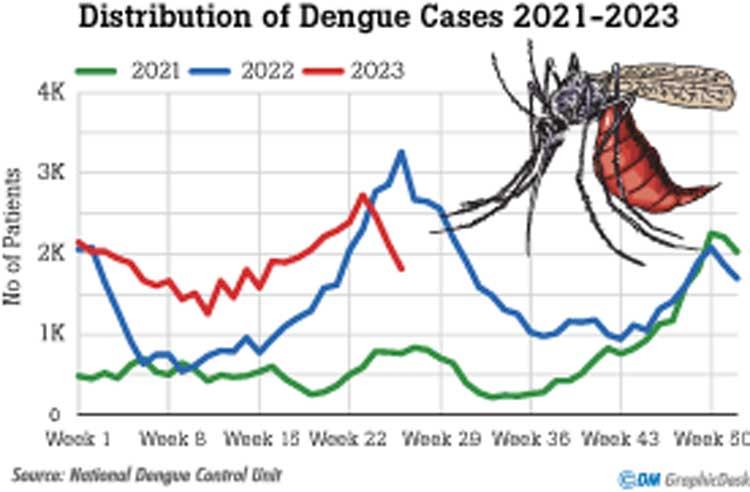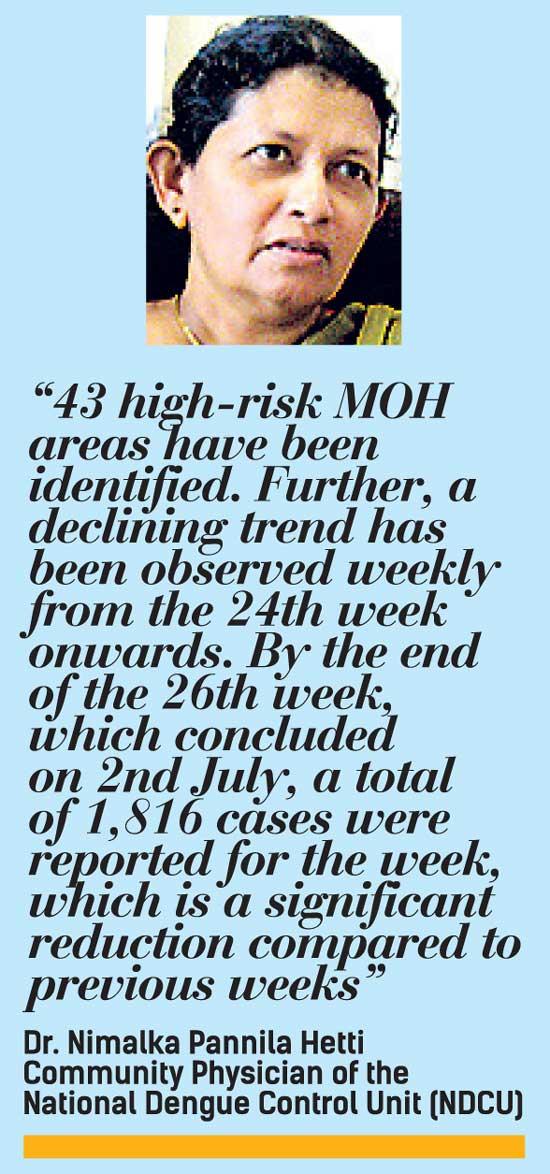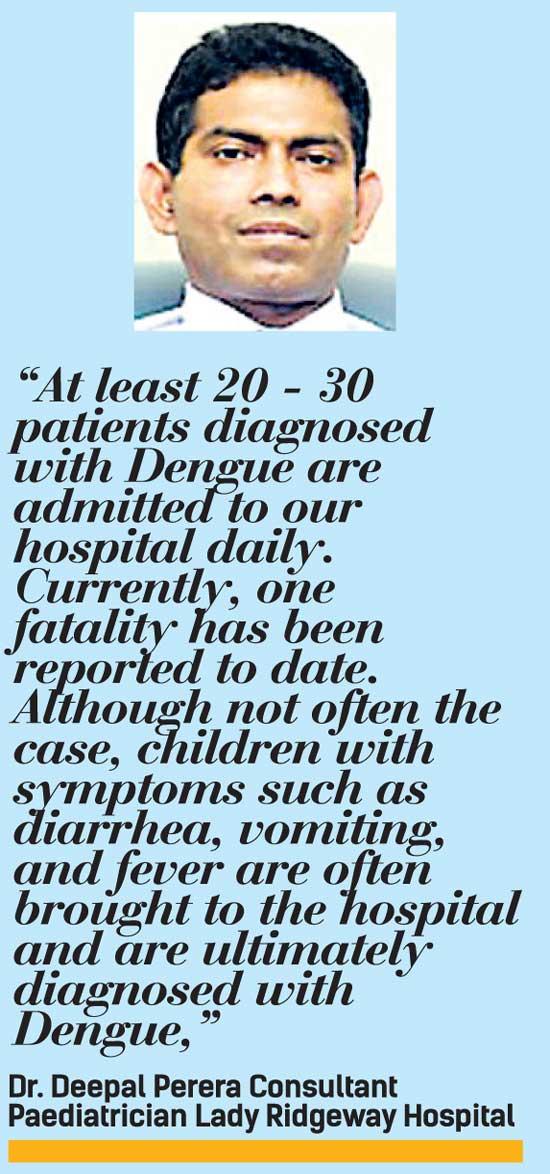11 Jul 2023 - {{hitsCtrl.values.hits}}

 Sri Lanka continues to be affected by the unprecedented health crisis presented via the mosquito-borne disease Dengue which is wreaking havoc in the nation. According to the World Health Organization (WHO) definition, Dengue, also known as Break-bone fever, is a viral infection caused by the Dengue virus (DENV) transmitted from the bite of an infected mosquito to people. The presence of the decease is commonly seen in tropical and subtropical climates. The WHO identified risk factors for dengue fever which includes unplanned urbanization- which branches into various social and environmental factors such as, “population density, human mobility, access to a reliable water source, water storage practice etc”. Climate change factors, vector adaptation to new environments, and climate, including the community’s lack of sufficient awareness, can be listed as other risk factors contributing to the spread of Dengue.
Sri Lanka continues to be affected by the unprecedented health crisis presented via the mosquito-borne disease Dengue which is wreaking havoc in the nation. According to the World Health Organization (WHO) definition, Dengue, also known as Break-bone fever, is a viral infection caused by the Dengue virus (DENV) transmitted from the bite of an infected mosquito to people. The presence of the decease is commonly seen in tropical and subtropical climates. The WHO identified risk factors for dengue fever which includes unplanned urbanization- which branches into various social and environmental factors such as, “population density, human mobility, access to a reliable water source, water storage practice etc”. Climate change factors, vector adaptation to new environments, and climate, including the community’s lack of sufficient awareness, can be listed as other risk factors contributing to the spread of Dengue.
Noting that increased community awareness is a decisive factor in helping mitigate the threat of Dengue, Community Physician of the National Dengue Control Unit (NDCU) Dr. Nimalka Pannila Hetti stated that public as well as private institutes need to accelerate their efforts to curb the spread of the vector-borne disease, which has already contributed to over 50, 000 dengue patients being reported island-wide.
The crisis at a glance
Among the 50,574 patients recorded as of July 6, 21.9 % and 21.6 % of the cases were recorded from Gampaha and Colombo districts respectively. Meanwhile, 32 dengue-related deaths have been recorded to date. “Despite other districts not contributing in similar proportions, less than 6 % of the total caseload was reported from Puttalam, Kurunegala, Kegalle, and Ratnapura districts, while 43 high-risk MOH areas have been identified. Further, a declining trend has been observed weekly from the 24th week onwards. By the end of the 26th week, which concluded on 2nd July, a total of 1,816 cases were reported for the week, which is a significant reduction compared to previous weeks” Dr. Hetti stated. Currently, efforts are underway to bring the total number of cases reported to at least below 1,000. To this end, the National Dengue Control Unit has employed effective measures. Stating that dengue outbreaks generally occur during the South West monsoon period and given the weather condition Sri Lanka is currently experiencing, Dr. Hetti further noted that compared to previous years the dengue outbreak commenced much earlier this year; as early as February.
Dr. Hetti further stressed that all individuals representing schools, work, construction premises and religious establishments must work together to eliminate breeding sites. “Within this context, it is crucial to empty dry and wet containers and maintain a clean environment void of potential breeding sites” Dr. Hetti added.
Identifying red flags
Colombo, Gampaha and Kalutara have recorded a significant number of Dengue cases despite the situation being observed in other districts as well. Raising concerns, Consultant Paediatrician at the Lady Ridgeway Hospital for Children, Dr. Deepal Perera emphasised that even youngsters are not spared and are susceptible to contracting the viral disease. He further stressed the need to differentiate between Dengue and infections such as Influenza, which is often associated with symptoms of runny nose, cough, and cold. In this context, Influenza is rapidly spreading among children exposed to school and preschool settings, daycare shelters, and families. However, Dengue is often observed in clusters and within family units due to the prevalence of infected mosquitoes in residential settings.
“At least 20 - 30 patients diagnosed with Dengue are admitted to our hospital daily. Currently, one fatality has been reported to date. Although not often the case, children with symptoms such as diarrhea, vomiting, and fever are often brought to the hospital and are ultimately diagnosed with Dengue. However, common presentations are accompanied by high fever, headaches, pain behind the eyes, joint pains and sometimes vomiting. Abdominal pains are symptoms often associated with complications of Dengue, Bleeding gums, bleeding in stools, urine and vomit are observed in Dengue hemorrhagic fever”, Dr. Perera stated. Losing consciousness, feeling dizzy, low blood pressure, poor appetite, and reduced urine output is observed in critical phases such as Dengue shock.
Following the onset of fever during 1 - 2 days, patients are recommended to do a Dengue Antigen Test (NS1) and if symptoms persist for more than 2-3 days, patients are recommended to conduct a Full Blood Count (FBC). In the event, the platelet count has decreased patients are advised to seek immediate medical attention.
It should also be noted that the number of ICU beds currently available at the LRH are not sufficient to cater to the health requirements of critical patients, particularly if an exponential outbreak in diseases or any other health emergency occurs.
Dengue management and challenges in disease prevention
During the treatment phase, patients are often prescribed Paracetamol according to the individual’s weight. Patients need to maintain a healthy fluid intake. However, doctors strongly recommend against the intake of fluids that are dark in colour such as red, brown or black to avoid confusions in situations where the patient presents with bleeding symptoms, Dr. Perera explained. “It is important to maintain the urine output in relation to the individual’s weight. Therefore, liquid intake needs to be administered according to the patient’s ideal body weight- most particularly in young children. In critical stages where the patient undergoes leakage, low blood pressure, and low urine output, patients are subjected to 48-hour close monitoring to ensure the stabilization of blood pressure, urine output, and pulse rate” he said.
Patients often present with symptoms such as increased urine output and an itchy skin rash, also known as a ‘recovery rash’ during the recovery stage. “With the spread of dengue fever, at least a 0.1 % death rate is observed, but it should be noted that 20 years ago, we witnessed a death rate of nearly 10%. Complications such as Dengue hemorrhagic fever and shock are plausible and may require blood transfusion or transfer to the Intensive Care Unit (ICU). Therefore, community awareness is quintessential in eliminating the threat of Dengue”, Dr. Perera further added.
Observing that the number of cases reported continues to remain high, Senior Consultant Physician Dr. Ananda Wijewickrama of the Infectious Diseases Hospital (IDH) noted that July often records the highest number of Dengue cases annually. “Among the four types of Dengue virus strains, it is Dengue Type 3 (DENV-3) that we mostly observe in patients currently” Dr. Wijewickrama noted. He further added that since the immunity for DENV-3 is lacking in the population, the potential to observe more Dengue-related cases, followed by complications is higher among patients.
“One problem we have often observed is how patients delay in visiting the hospital and seeking medical attention. The second issue is related to how some patients continue to use certain types of Nonsteroidal anti-inflammatory drugs, or NSAIDs such as diclofenac, naproxen, aspirin, and ibuprofen to seek relief from the symptoms. These factors too could lead to other health complications in patients, Dr. Wijewickrama explained.
Noting that Dengue control or prevention needs to be a long-term and demands a multi-sectoral approach, Dr. Wijewickrama pointed out that the country lacks the vision for a long-term strategy to mitigate the threat of Dengue. Adding that public officials, the general public as well as the media are agitated over the topic only when the number of Dengue cases escalates, Dr. Wijewickrama stressed the need for long-term initiatives to be employed constantly, to address the encumbrances caused by a health issue viewed as a constant in Sri Lanka. Therefore, increased community awareness, expert knowledge on climate change impacts and vector adaptation to new environments, and a long-term strategy supported by a multi-sectoral approach are crucial elements to be taken into serious account to mitigate the threat of Dengue, which continues to pose a challenge to the security of Sri Lanka’s healthcare sector.


27 Dec 2024 35 minute ago
27 Dec 2024 50 minute ago
27 Dec 2024 3 hours ago
27 Dec 2024 3 hours ago
27 Dec 2024 3 hours ago